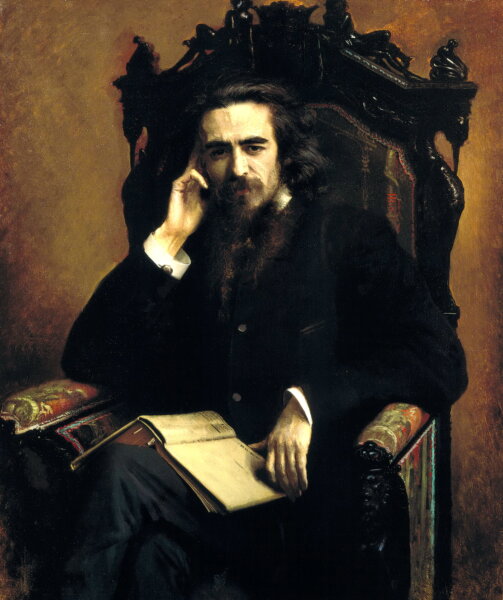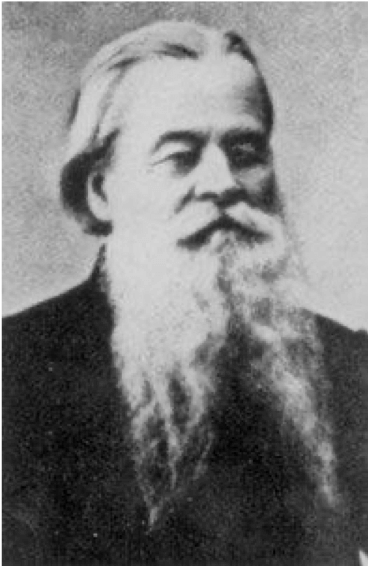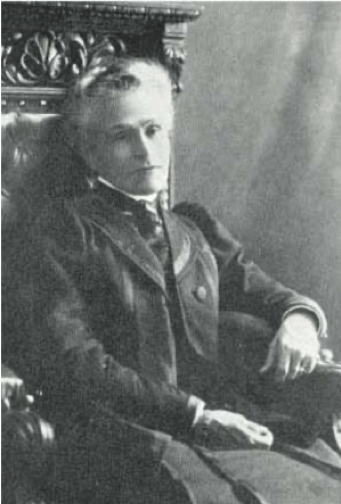From One Peter Five
By Maxim Grigoririeff
Read: What is the Russian Catholic Church? Part I: Introduction
Vladimir Solovyov (1853–1900), Russian religious thinker
 It was in 1888 in Paris that Solovyov published the article “The Russian Idea.” In it, the philosopher asserted that Russian Orthodoxy, in order to overcome its own spiritual crisis, needed to be reunited with the Catholic Church, headed by the bishop of Rome. Despite the fact that Solovyov did not see the possibility of a unity of the Eastern and Western Churches in corporate terms happening any time soon, he did eventually convert to Catholicism, while never becoming Latin (a future article will treat this matter in depth).
It was in 1888 in Paris that Solovyov published the article “The Russian Idea.” In it, the philosopher asserted that Russian Orthodoxy, in order to overcome its own spiritual crisis, needed to be reunited with the Catholic Church, headed by the bishop of Rome. Despite the fact that Solovyov did not see the possibility of a unity of the Eastern and Western Churches in corporate terms happening any time soon, he did eventually convert to Catholicism, while never becoming Latin (a future article will treat this matter in depth).
Father Nikolay Tolstoy (1867-1938), the first Russian Catholic priest of the Byzantine rite
In November 1894, the Orthodox priest Nikolai Tolstoy officially joined the Catholic Church. In his ‘Confession’ Fr. Nikolay writes: ‘I believed that the Eastern Church as a whole should unite with the Roman Church and form with it the One Catholic Church. Before it can happen, one should act as if we lived in times before the separation and as if that separation had not existed and did not exist.’ Father Nikolay knew Vladimir Solovyov and it was on February 18, 1896, on the feast day of St. Leo the Great, Pope of Rome, in Moscow, that in the domestic church of Fr. Tolstoy himself, Solovyov officially joined the Catholic Church according to the Byzantine rite.[1]
Vladimir Solovyov argued that it had been only by re-establishing full communion with Rome that he did finally become a true Eastern believer like those great and holy Fathers of the ancient East. This he says in his fundamental text Russia and the Universal Church:
‘As a member of the true and venerable Orthodox Eastern or Greek-Russian Church, speaking neither through the mouth of that anti-canonical Synod, nor through the secular power officials, but by the voice of my great Fathers and Teachers, I recognise as the supreme judge in the matter of religion the one who was recognised as such by Saint Irenaeus, Saint Dionysius the Great, Saint Athanasius the Great, Saint John Chrysostom, Saint Cyril, Saint Flavian, Blessed Theodoret, Saint Maximus the Confessor, Saint Theodore Studite, Saint Ignatius, etc., – namely, Apostle Peter, who lives in his successors and did not hear in vain the words of the Lord: ‘and upon this rock I will build my church; strengthen thy brethren; feed my sheep, feed my lambs.’
Due to his active participation in Solovyev’s conversion, Fr. Nikolay was threatened with arrest, so he was forced to leave Russia. His life, though, ended as the life of a true Russian martyr in the homeland: he was shot by the Soviets on February 4, 1938.
Fr. Aleksey Zerchaninov (1848-1933), head of the Mission for Eastern Rite Russian Catholics

Fr. Aleksey Zerchaninov
In 1896, the parish pastor of one village in Arzamas district near Nizhny Novgorod, father Alexey Zerchaninov, declared his allegiance to Catholicism. After a thorough study of patristic writings, the history of the Councils, liturgical texts, he, without any external influence, came to the conclusion that the Catholic doctrine is true. He was motivated in his studies by the need to debate with the Old Believers active in the region and to support his own Church, which was in a deep spiritual crisis at the moment.
It was for his religious views that he was later arrested and sent to the Suzdal prison as an apostate from the official Russian State Church. Lacking both the special education of a scholar and a simple notebook, there he wrote on small random sheets of paper his great 12 volume apologia for the Catholic faith titled The Kingdom of God in the World: Compilation of Materials Read by a Village Amateur, which was based solely on books and materials officially published by the Russian Orthodox Church.[2]
Natalia Ushakova (+ 1917), a Russian Catholic aristocrat

Natalia Ushakova (+ 1917)
At the request of the noblewoman Natalia Sergeevna Ushakova, a Russian Catholic herself, Fr. Alexey was released from prison. He then left for Lvov, where the great Ukrainian Catholic Metropolitan, Venerable Andrey Sheptytsky, received him, intending to send him back to Russia.
After the Royal manifesto on Religious Freedom in 1905, Father Alexy moved to St. Petersburg, where he began to celebrate the Russian Liturgy (that is, the Byzantine rite in Church Slavonic) with the commemoration of the Pope. Around him, a community began to form, which immediately was met with hostile rejection by the state authorities. Natalia Ushakova, using her family ties with the Minister of Internal Affairs and Chairman of the Council of Ministers Pyotr Stolypin, she managed to protect the community. This is how the first parish of the Russian Catholic Church of the Byzantine Rite was born, which was given the name the Descent of the Holy Spirit. At that time, the parish was located at 12 Polozova Street and existed unofficially.
Soon Fr. Alexey would be assisted by another priest – Fr. John Deibner, who had secretly joined the Catholic Church and was ordained a priest by Metropolitan Andrey Sheptytsky in 1902.
In 1907, Fr. Alexey went to Rome for a private audience with Pope St. Pius X in order to ask the Holy Father to permit Russian Catholics to keep to their native rite after conversion. To this he received the formal approval and enthusiastic support of the Vicar of Christ.
The Importance of the Byzantine Rite in Russian Catholicism
But why would such a high approval be needed for such a simple and natural development, as it seems to us?
Latin Catholics had lived in the territory of the Eastern Orthodox Russian state for many centuries after the schism. Although Eastern Orthodoxy was the official religion, and the Czar headed the Church through his official (the Chief Procurator of the Holy Synod), as they positioned themselves ‘defenders of the faith’, Catholics, Protestants and non-Christians were allowed to live in the country and even enjoy some freedom. Latin Catholics not only lived in Russia and faithfully served its people and the Czar, but sometimes held quite high positions. For example, Giulio Renato de Litta Visconti Arese, known in Russia as Iuliy Pompeevich Litta, was the highest court official in the country from 1826 to 1839. The government allowed the building of Catholic churches and provided financial aid for this.
The only condition that the Russian state demanded was that the ‘non-Orthodox’ did not engage in direct proselytism among the Russians, never claiming a place of their own in the national myth of the country. To be a Russian ought to mean not only to have Eastern Orthodox faith, but to belong to the ‘right’ state-approved Church, which literally functioned as civil registry office. That is why starting with Peter the Great and Catherine II, the Czars were not particularly fond of the Uniates’ challenging of the Russian national identity as they dreamt of and tried to create. After all, loyalty to the St. Petersburg Czar-headed Holy Synod, not to the Pope, was a formal guarantee of political loyalty and social stability.
Striving to survive in the diaspora, in extremely tough conditions after the third partition of Poland, Latin Catholics in Russia would follow these rules very precisely. Many thousands of Catholics living in new Western territories of the Russian Empire were forcibly integrated into the Russian state legal system. In this context the emergence of Eastern Rite Russian Catholics was an equal scandal both for the Orthodox Church and for the ‘receiving party’ – the Latin Catholics – who not only looked for no trouble, but often considered their own rite to be the best expression of the Catholic faith superior to any Eastern one.
Next week: Venerable and Blessed Founders of the Russian Catholic Exarchate.
[1] The full text of this was published in “Kitezh” journal (No. 8-12, December 1927, Warsaw), cf. Mochulsky, ‘Vladimir Solovyev. Life and Teachings.’
[2] О. Алексей Зерчанинов [Звездин А. Н., псевд.], Царство Божие в мире: Компиляция мат-лов, прочит. деревенским дилетантом. Краков, 1897-1904. 12 кн.; Непокладные люди. Краков, 1904.
No comments:
Post a Comment
Comments are subject to deletion if they are not germane. I have no problem with a bit of colourful language, but blasphemy or depraved profanity will not be allowed. Attacks on the Catholic Faith will not be tolerated. Comments will be deleted that are republican (Yanks! Note the lower case 'r'!), attacks on the legitimacy of Pope Leo XIV as the Vicar of Christ, the legitimacy of the House of Windsor or of the claims of the Elder Line of the House of France, or attacks on the legitimacy of any of the currently ruling Houses of Europe.